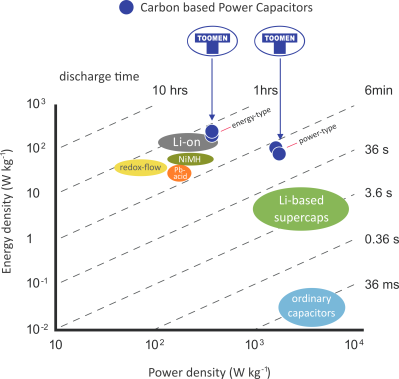Kurt.energy is promoting a new line of hybrid supercapacitors. By itself, that wouldn't be very newsworthy, but the company claims these graphene-based supercapacitors merge the best features of both supercapacitors and lithium-ion batteries. Based on technology from a company called Shenzhen Toomen New Energy, the capacitors are optimized for either high energy or high power. They can reportedly charge and discharge 10-20 times faster than lithium-ion batteries. Of course, we've heard wild claims surrounding graphene capacitors before and, so far, they haven't seemed very credible.
In addition to high performance, the company claims the capacitors are safe from overcharging, short circuit, and other safety issues that plague batteries. The devices are said to operate — including charging — from -40C to 80C. You can see a video from the company, below.
 Assuming this all proves out, it seems like the devices would open up a lot of new design possibilities. Designs would no longer need complex charging systems, active thermal management, and would degrade gracefully and safely.
Assuming this all proves out, it seems like the devices would open up a lot of new design possibilities. Designs would no longer need complex charging systems, active thermal management, and would degrade gracefully and safely.
New Atlas has a good write up where they interview the Belgian engineer who saw the Toomen devices at a trade show and after testing them brought them to market with Kurt.energy. According to that article, the capacitor uses a graphene electrode and a metallic oxide material for the other electrode. The energy storage is like that of a capacitor — there is no chemical reaction generating electricity.
The capacitors aren't in full production yet. There are a few scaling problems with charging at such fast rates, too. According to the New Atlas article, a 10 kWh pack charged in 5 minutes would require a 100 kW charger. However, the new capacitors could have big implications for hybrid cars and solar. We also remember a supercap-powered bicycle that didn't turn out very well.
With limited production, the price is still somewhat high although that is offset by the simplistic power management system required as well as the lower weight and size of the units. The safety, temperature range, and rapid charging might also tip the balance against traditional components.
Extraordinary claims require extraordinary proof, of course, and we haven't seen these in real life. We will be interested to see if the components live up to the hype. We've seen graphene supercapacitors show up before and it still makes us suspicious. What do you think? Is this the next power revolution or just another wild claim?
via https://ift.tt/2U3QBJU

No comments:
Post a Comment